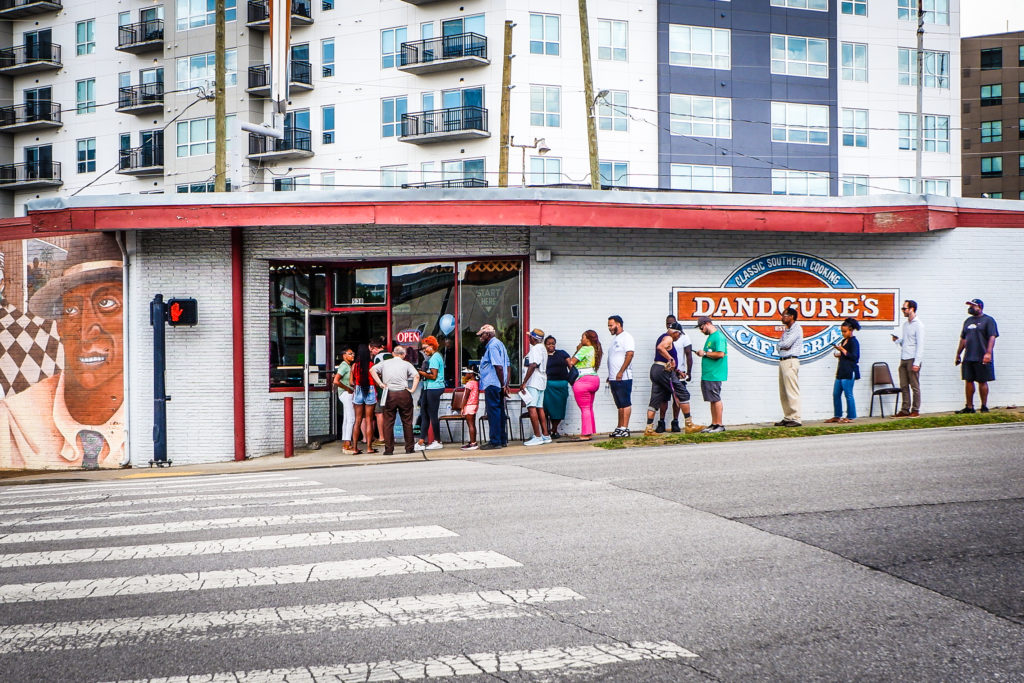
In Nashville, mom-and-pop businesses that make up the city’s cultural fabric continued to close their doors in 2022.
The city lost Hermitage Café, Exit/In, Mercy Lounge, a Piggly Wiggly, Emma’s Flowers and Dandgure’s just to name a few.
Scroll through memory lane to hear why people felt these cultural landmarks were important.
Dandgure’s
Dandgure Robinson, known by customers as Mr. Dan, opened his meat and three in 1991. After 31 years, he decided to close the business and enjoy retirement. On the last day, customers waited in line for over a hour in the sweltering heat while employees handed out free bottles of ice cold water. WPLN documented the restaurant’s last day of service and what it meant to the community.
“Come through the door and we know you by name,” said De’Shawn Reams, Mr. Dan’s right-hand man. “I pretty much know what you’re going to eat because I’m fixing your plate every day. You get that type of relationship with us and the customers that’s what they’re going to miss the most. That true southern hospitality.”
Piggly Wiggly on West End
 Julia Ritchey Julia Ritchey
Julia Ritchey Julia Ritchey Community members were heartbroken over the closure of Piggly Wiggly on West End.
Back in 1916, Piggly Wiggly got its start in Memphis, TN. The chain became an early prototype of the modern supermarket, with locations all across the South.
A local developer had owned the land under the West End Piggly Wiggly since 1923. In April, the grocery store closed so it could be demolished for a 15-story apartment building. Although there are two Piggly Wigglys remaining in Nashville, residents in the area felt like something more personal was being taken away.
For residents of nearby Parthenon Towers, the store served as an accessible, walkable destination for weeknight staples
WPLN documented the store’s final week and spoke to longtime customer Ken Blair, who purchased a box of matches just to have a reason to visit his friends at the store.
“Everybody down here is on a first name basis,” Blair said. “It’s like a family atmosphere.”
Mercy Lounge
 Paige Pfleger WPLN News
Paige Pfleger WPLN NewsTristen performs at Mercy Lounge.
Mercy Lounge was an intimate club that opened in January of 2003. The event space helped boost local artists and gave concert goers a chance to see Snoop Dogg, The White Stripes, Adele and Katy Perry up close and personal. But at the end of May, they did their final shows in the Cannery Row space.
“Growth is not always progress, money is not meaning, and amenities are not culture,” Tristen Gaspadarek said to a crowd of cheers during a farewell performance.
Mercy Lounge was acquired by Nashville-based DZL, which had plans to rebrand the space. The operators of Mercy Lounge said last year they were looking for another venue to relocate, but have yet to make any announcement since their closure.
Exit/In
 Rachel Iacovone WPLN News
Rachel Iacovone WPLN NewsMidtown music venue Exit/In closed after Thanksgiving, its owners announced on social media.
Another blow to the small music venue business was the closure of Exit/In. The venue opened in 1971 and although it advocated and survived the financial strain of the COVID-19 pandemic, it couldn’t escape the city’s hot real estate market.
Owner Chris Cobb Cobb says these closures hurt early-career musicians who rely on smaller venues to build a following.
“They must exist for the ecosystem to thrive,” he said. “No one goes from their bedroom or dorm room or garage to the arena. That’s not the way that it works.”
There’s also a loss of collective memory when a place closes — stories that become ingrained in the physical space over time.
“Some people remember the story of the (Red Hot) Chili Peppers having Thanksgiving dinner on the floor in Exit/In. That was [a former employee] Bruce. He booked the Chili Peppers and had the dinner, catered turkey, dressing, the whole bit,” said Cobb.
Ernest Tubb Record Shop
The record store was opened in 1947 by Ernest Tubb, known as the father of honky-tonk. It became a premiere destination for country vinyl fans, who also flocked to its Midnite Jamboree sessions for live music. But this spring, the shop closed up after 75 years on Broadway.
Correction: This story originally gave the wrong closing date for the Hermitage Cafe. It closed in late 2021, not 2022. The story has also been updated to add Ernest Tubb Record Shop to the businesses that closed in 2022.

